Christians in India targeted under new anti-conversion laws, group says

A rights group has called for the repeal of new anti-conversion legislation in an Indian state which they say has already been used to target Christians.
Christian Solidarity Worldwide (CSW) said in a media release that the newly promulgated Freedom of Religion Ordinance 2020 in the state of Madhya Pradesh expands the scope of criminalizing conversion.
The group said that there are concerns that, like similar laws in other Indian states, it will be used to target religious minorities with false accusations of forced conversion and miscast conversion as an act perpetrated on a person by another rather than an act of free will.
In recent months, similar ordinances have been introduced in other states dominated by the Hindu nationalist Bharatiya Janata Party (BJP) such as Uttar Pradesh, Haryana and Karnataka.
CSW’s President Mervyn Thomas said the so-called ‘freedom of religion’ laws are in fact curbing people’s freedom to choose their religion or belief.
“They also contradict the national constitution of India, which guarantees freedom of religion or belief, and are being weaponized by religious fundamentalists to instigate fabricated charges against and create fear within India’s Muslim and Christian communities,” Thomas said.
“No one is being held to account for this or for the fact that the BJP is politicizing religious conversion, with the aim of making it illegal,” he said. “We call for the immediate repeal of these laws, and urge investigating authorities to be more circumspect in handling allegations made under their provisions, given that they are open to abuse.”
CSW said that on Jan. 27, a prayer meeting in a Madhya Pradesh village was interrupted by mob of approximately 40 people who accused the Christians there of “alluring” people to convert to Christianity. The group then said that police escorted five Christians to the police station for interrogation, while the remaining Christians were locked inside the prayer meeting hall.
According to a local source, a mob of about 200 gathered at the police station calling for action to be taken against the Christians. Three pastors remain in prison and have had first information reports registered against them under the new ordinance.
The Freedom of Religion Ordinance 2020 was passed Jan. 7 and CSW said it imposes strict penalties and expands the scope of criminalizing ‘conversion.’
The stated objective of the ordinance is “to provide freedom of religion by prohibiting conversion from one religion to another by misrepresentation, allurement, use of threat or force, undue influence, coercion, marriage or any fraudulent means.” However, CSW said that there are concerns that like similar laws in other Indian states, it is used to target religious minorities with false accusations of forced conversion and miscast conversion as an act perpetrated on a person by another rather than an act of free will.
In addition to the crackdown on the Jan. 27 prayer meeting, CSW has received reports of several other incidents in which Christians have been targeted in the state under the new ordinance.
The US Commission for International Religious Freedom, an independent body dedicated to protecting freedom of religion, has recently recommended India to be listed as a “country of particular concern.”
United Nations officials have recently raised concerns over what they describe as “the growing trend of violence towards religious minorities” in the country.
Christians make up 2.3 percent of India’s population of more than 1.3 billion of whom some 80 percent are Hindu. There are about 200 million Muslims in the country. - LiCAS.news
Radio Veritas Asia (RVA), a media platform of the Catholic Church, aims to share Christ. RVA started in 1969 as a continental Catholic radio station to serve Asian countries in their respective local language, thus earning the tag “the Voice of Asian Christianity.” Responding to the emerging context, RVA embraced media platforms to connect with the global Asian audience via its 21 language websites and various social media platforms.














